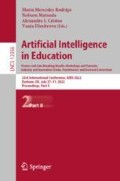Abstract
The academic evaluation process, even today, is the subject of much discussion. This process can use quantitative analysis to indicate the level of learning of students to support the decision about whether the student can attend the next curriculum phase. From this context, this paper analyzes the history of students’ grades in the 1st year of a technical course in informatics integrated to high school, for the years 2020 and 2021, through the linear regression method, supported by genetic programming, to find out the influence of the grades of the first two bimesters concerning the final grade. The main results show that the genetic programming algorithm favored the search for linear regression models with a good fit to the datasets with students’ data. The resultant models proved accurate and explained more than 74% of the datasets.
Access this chapter
Tax calculation will be finalised at checkout
Purchases are for personal use only
References
Schoeffel, P., Wazlawick, R.S., Ramos, V.: Impact of pre-university factors on the motivation and performance of undergraduate students in software engineering. In: 2017 IEEE 30th Conference on Software Engineering Education and Training (CSEE &T), pp. 266–275 (2017)
Gibbs, G., Simpson, C.: Conditions under which assessment supports students’ learning. Learn. Teach. High. Educ. 3–31 (2005)
Black, P., Harrison, C., Lee, C.: Assessment for Learning: Putting It Into Practice. McGraw-Hill Education (UK), London (2003)
Entwistle, N.: Concepts and conceptual frameworks underpinning the ETL project. Occas. Rep. 3, 3–4 (2003)
Luckesi, C.C.: Avaliação da aprendizagem escolar: estudos e proposições. Cortez editora (2014)
Nelder, J.A., Wedderburn, R.W.M.: Generalized linear models. J. Roy. Stat. Soc. Ser. A (Gen.) 135(3), 370–384 (1972)
Esmeraldo, G., Barros, E.: A genetic programming based approach for efficiently exploring architectural communication design space of MPSOCs. In: 2010 VI Southern Programmable Logic Conference (SPL), pp. 29–34 (2010)
Babovic, V., Keijzer, M.: Rainfall runoff modelling based on genetic programming. Hydrol. Res. 33(5), 331–346 (2002)
Arnaldo, I., Krawiec, K., O’Reilly, U.: Multiple regression genetic programming. In: Proceedings of the 2014 Annual Conference on Genetic and Evolutionary Computation, GECCO 2014, pp. 879–886 (2014)
Goldberg, D.E.: Genetic Algorithms. Pearson Education India, Noida (2006)
Weisberg, S.: Applied Linear Regression, vol. 528. Wiley, Hoboken (2005)
Willmott, C.J., Matsuura, K.: Advantages of the mean absolute error (MAE) over the root mean square error (RMSE) in assessing average model performance. Climate Res. 30(1), 79–82 (2005)
Faradonbeh, R.S., Jahed Armaghani, D., Monjezi, M.: Development of a new model for predicting flyrock distance in quarry blasting: a genetic programming technique. Bull. Eng. Geol. Env. 75(3), 993–1006 (2016). https://doi.org/10.1007/s10064-016-0872-8
Author information
Authors and Affiliations
Corresponding author
Editor information
Editors and Affiliations
Rights and permissions
Copyright information
© 2022 Springer Nature Switzerland AG
About this paper
Cite this paper
Esmeraldo, G. et al. (2022). Using Genetic Programming and Linear Regression for Academic Performance Analysis. In: Rodrigo, M.M., Matsuda, N., Cristea, A.I., Dimitrova, V. (eds) Artificial Intelligence in Education. Posters and Late Breaking Results, Workshops and Tutorials, Industry and Innovation Tracks, Practitioners’ and Doctoral Consortium. AIED 2022. Lecture Notes in Computer Science, vol 13356. Springer, Cham. https://doi.org/10.1007/978-3-031-11647-6_30
Download citation
DOI: https://doi.org/10.1007/978-3-031-11647-6_30
Published:
Publisher Name: Springer, Cham
Print ISBN: 978-3-031-11646-9
Online ISBN: 978-3-031-11647-6
eBook Packages: Computer ScienceComputer Science (R0)

